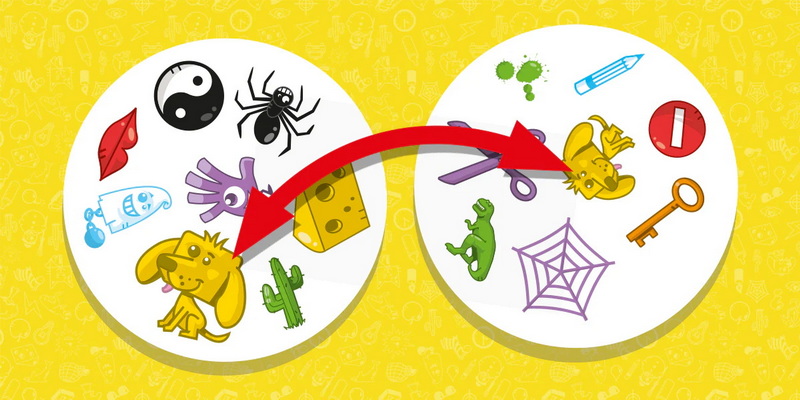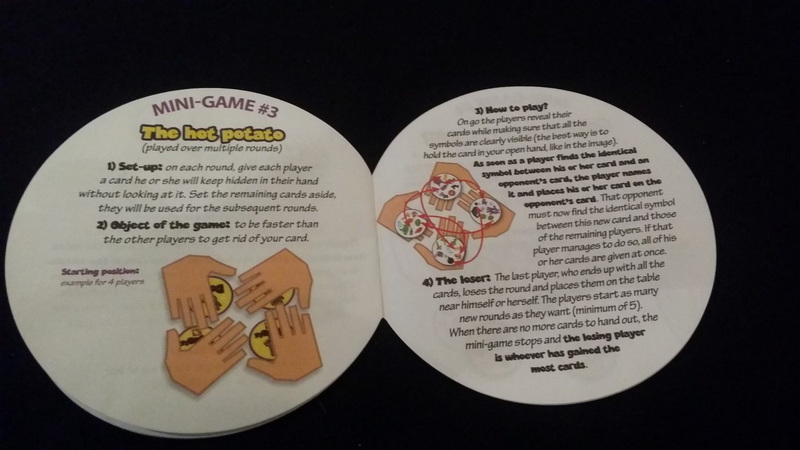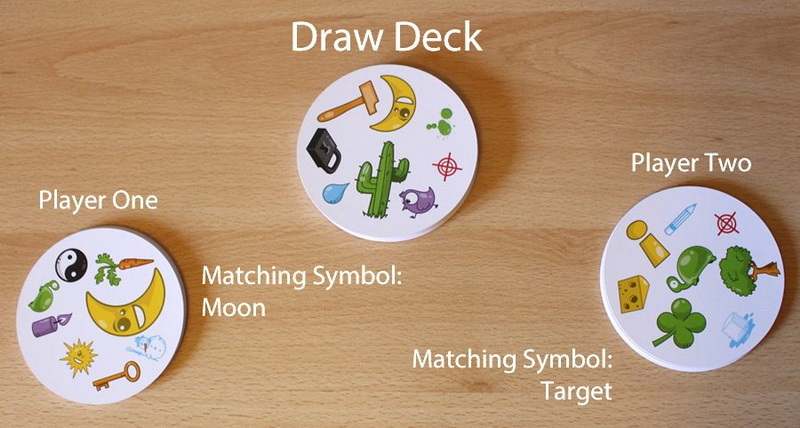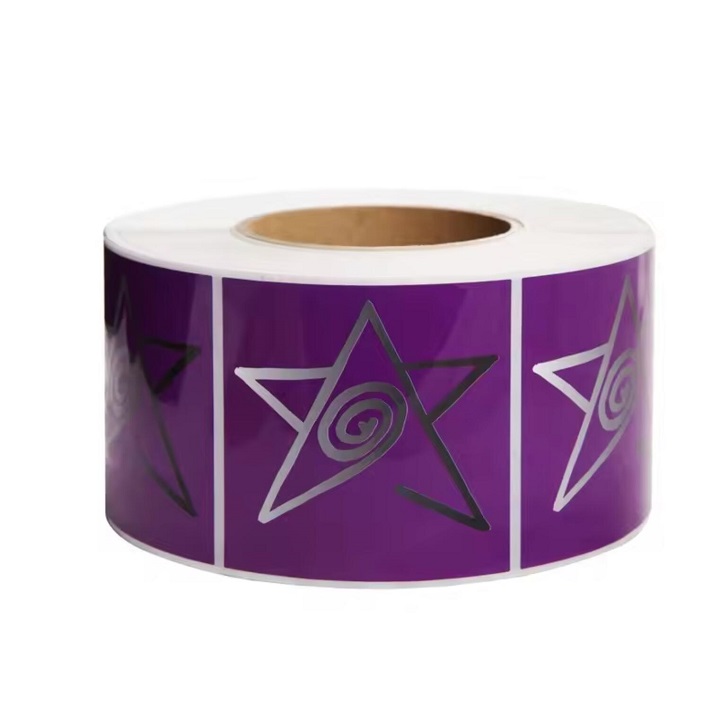Content Menu
● Introduction
● Components of Dobble
● Basic Rules and Gameplay
>> Setting Up
>> Core Mechanics
● Popular Game Modes
>> The Tower of Doom
>> The Well
>> Hot Potato
>> The Poisoned Gift
● Strategies for Success
● The Mathematics Behind Dobble
● Variations and Expansions
● Benefits of Playing Dobble
● Conclusion
● Related Questions and Answers
>> 1. How many symbols are there in total in a standard Dobble deck?
>> 2. Can Dobble be played with more than 8 players?
>> 3. Are there any educational applications for Dobble?
>> 4. How long does an average game of Dobble last?
>> 5. Is there a digital version of Dobble available?
● Citations:
Introduction
Dobble, also known as Spot It! in some regions, is a fast-paced, observation-based card game that has gained immense popularity among players of all ages. This engaging game combines elements of pattern recognition, quick reflexes, and strategic thinking, making it an excellent choice for family game nights, parties, or casual gatherings. In this comprehensive guide, we'll explore the ins and outs of Dobble, including its components, basic rules, various game modes, strategies for success, and the mathematics behind its unique design.

Components of Dobble
Dobble consists of a compact, circular tin containing 55 cards. Each card features eight different symbols drawn from a pool of 57 unique symbols[1]. The symbols vary in size and orientation but maintain their distinctive shapes across all cards. The game's design ensures that any two cards in the deck share exactly one matching symbol, which forms the core mechanic of the game[1][4].
Basic Rules and Gameplay
Setting Up
To begin playing Dobble, follow these simple steps:
1. Remove all cards from the tin and shuffle them thoroughly.
2. Choose a game mode (we'll discuss various modes later).
3. Deal cards according to the chosen game mode's instructions.
4. Ensure all players understand the basic premise: to find the matching symbol between two cards as quickly as possible[1][4].
Core Mechanics
The fundamental gameplay of Dobble revolves around these key principles:
1. Speed: Players must be the fastest to spot the matching symbol between two cards.
2. Observation: Carefully scan both cards to identify the common symbol.
3. Vocalization: Once a match is found, the player must call out the name of the matching symbol.
4. Action: Depending on the game mode, players will either take, discard, or place cards based on successful matches[1][4].
Popular Game Modes
Dobble offers several game modes, each with its own unique twist on the core mechanics. Here are some of the most popular variations:
The Tower of Doom
Setup:
- Place one card face-up in the center of the table (the "Tower").
- Deal the remaining cards evenly among all players, face-down[1].
Gameplay:
1. Players simultaneously flip their top card.
2. Everyone races to find the matching symbol between their card and the Tower card.
3. The first player to spot and call out the match takes the Tower card and places their card as the new Tower.
4. Play continues until one player has collected all the cards[1][4].
Winner: The player with the most cards at the end of the game.
The Well
Setup:
- Place one card face-up in the center of the table.
- Deal the remaining cards evenly among all players, face-down[5].
Gameplay:
1. Players simultaneously flip their entire stack of cards face-up.
2. Everyone races to find a match between their top card and the center card.
3. The first player to spot and call out a match places their card on top of the center pile.
4. Play continues until one player has discarded all their cards[5].
Winner: The first player to get rid of all their cards.
Hot Potato
Setup:
- Deal one card face-down to each player.
- Set aside the remaining cards for later rounds[5].
Gameplay:
1. On the count of three, all players flip their cards face-up.
2. Players look for matches between their card and other players' cards.
3. When a match is found, the player calls it out and gives all their cards to the player with the matching card.
4. Play continues until one player has all the cards[5].
Winner: The player with the fewest cards after a predetermined number of rounds.
The Poisoned Gift
Setup:
- Deal one card face-down to each player.
- Place the remaining cards face-up in the center to form a draw pile[5].
Gameplay:
1. Players simultaneously flip their cards face-up.
2. Everyone looks for a match between the center card and any other player's card.
3. The first player to spot a match calls it out and places the center card on top of the matching player's card.
4. A new card from the draw pile becomes the center card.
5. Play continues until the draw pile is exhausted[5].
Winner: The player with the fewest cards at the end of the game.

Strategies for Success
To improve your performance in Dobble, consider these strategies:
1. Focus on Colors: Many players find it helpful to scan for specific colors first, as they can be easier to identify quickly. For example, start with orange and green symbols, then move on to blue, red, and yellow[15].
2. Card Positioning: Hold your card close to the center card or your opponent's card to make comparisons easier[15].
3. Card Rotation: Slowly rotate your card while scanning, as this can sometimes help reveal matches that weren't immediately apparent[15].
4. Symbol Familiarity: Take time to familiarize yourself with all the symbols in the deck. This can help you recognize them more quickly during gameplay[4].
5. Peripheral Vision: Try to use your peripheral vision to scan both cards simultaneously, rather than focusing on one card at a time[4].
6. Practice: Like any skill, your ability to spot matches quickly will improve with practice. Consider playing solo games to hone your observation skills[4].
The Mathematics Behind Dobble
The design of Dobble is based on some fascinating mathematical principles:
1. Dobble Numbers: The number of cards and symbols in a Dobble deck follows a specific pattern. For a deck with $s$ symbols per card, the maximum number of cards and unique symbols is given by the formula:
$n = k = 1 + s(s - 1) = s^2 - s + 1$
These numbers are called "Dobble numbers" and include 1, 3, 7, 13, and 21[6][10].
2. Finite Projective Planes: The structure of Dobble is related to the mathematical concept of finite projective planes. This connection ensures that any two cards share exactly one symbol[6].
3. Symbol Distribution: Each symbol appears on exactly eight cards in the standard 55-card deck. This balanced distribution is crucial for maintaining fairness and consistency in gameplay[6].
Understanding these mathematical principles can give players a deeper appreciation for the game's design and help explain why finding matches is consistently challenging yet always possible.
Variations and Expansions
While the standard Dobble game is incredibly versatile, there are several variations and expansions available:
1. Dobble Kids: A simplified version with fewer symbols per card, designed for younger players[4].
2. Dobble Beach: Features beach-themed symbols and waterproof cards for poolside play.
3. Dobble Hollywood: Includes movie-related symbols for film enthusiasts.
4. Dobble Numbers & Shapes: Focuses on numerical and geometric symbols, adding an educational twist.
5. Dobble Connect: A new variation that introduces a board game element, where players create lines of matching symbols[17].
These variations maintain the core Dobble mechanics while offering fresh themes and challenges for players to enjoy.
Benefits of Playing Dobble
Beyond its entertainment value, Dobble offers several cognitive and social benefits:
1. Improved Visual Perception: The game enhances players' ability to quickly process visual information and identify patterns[7].
2. Attention Division: Players must divide their attention between multiple visual scenes, improving multitasking skills[7].
3. Memory Enhancement: The game exercises working memory as players hold symbols in mind while scanning for matches[7].
4. Social Interaction: Dobble's fast-paced nature and simultaneous play foster social engagement and friendly competition[4].
5. Stress Relief: The quick rounds and lighthearted gameplay can serve as an effective stress-reducer for players of all ages.
Conclusion
Dobble is a remarkably simple yet endlessly engaging card game that combines speed, observation, and fun in a compact package. Its versatile gameplay modes, mathematical underpinnings, and cognitive benefits make it a standout choice for game enthusiasts and casual players alike. Whether you're looking to sharpen your mental reflexes, enjoy quality time with family and friends, or simply have a blast with a fast-paced card game, Dobble offers something for everyone. As you practice and develop your strategies, you'll find yourself becoming increasingly adept at spotting those elusive matching symbols, turning each game into an exciting challenge of visual prowess and quick thinking.

Related Questions and Answers
1. How many symbols are there in total in a standard Dobble deck?
A standard Dobble deck contains 57 unique symbols. This number is derived from the mathematical properties of the game, which ensure that any two cards share exactly one symbol[6].
2. Can Dobble be played with more than 8 players?
While the official rules recommend 2-8 players, Dobble can be adapted for larger groups by forming teams. This team-based approach allows for more players to participate while maintaining the game's fast-paced nature[5].
3. Are there any educational applications for Dobble?
Yes, Dobble can be used as an educational tool to improve visual perception, pattern recognition, and quick thinking skills. Some variations, like Dobble Numbers & Shapes, are specifically designed with educational purposes in mind, helping children learn basic mathematical concepts through play[4].
4. How long does an average game of Dobble last?
A typical round of Dobble lasts about 5-10 minutes, depending on the chosen game mode and the number of players. This short duration makes it an excellent filler game or a quick activity between longer games[1].
5. Is there a digital version of Dobble available?
Yes, digital versions of Dobble (often under the name Spot It!) are available for various platforms, including mobile devices and online gaming sites. These digital adaptations maintain the core gameplay while offering the convenience of digital play and often include additional features or game modes[4].
Citations:
[1] https://www.crafts4kids.co.uk/blogs/news/how-do-you-play-dobble
[2] https://boardgame.bg/dobble%20connect%20rules.pdf
[3] https://www.101computing.net/the-dobble-algorithm/
[4] https://gaming.clickdo.co.uk/how-to-play-dobble/
[5] https://cdn.svc.asmodee.net/production-asmodeeca/uploads/2023/07/DobbleAsterix_EN_Rules.pdf
[6] https://www.petercollingridge.co.uk/blog/mathematics-toys-and-games/dobble/
[7] https://theconversation.com/dobble-what-is-the-psychology-behind-the-game-204223
[8] https://www.goodplayguide.com/reviews/dobble/
[9] https://www.connexxion24.com/downloads/anleitungen/Anleitung---english-Dobble-18834-doc-2.pdf
[10] https://www.petercollingridge.co.uk/blog/mathematics-toys-and-games/dobble/
[11] https://cdn.shopify.com/s/files/1/0572/1076/5512/files/Dobble_Instructions_600_x_1200_MAIN_CARD_AND_ARROW.jpg?v=1699005700&sa=X&ved=2ahUKEwiv8MWT05eLAxUIIEQIHfEbIeoQ_B16BAgCEAI
[12] https://cdn.shopify.com/s/files/1/0572/1076/5512/files/Dobble_Instructions_600_x_1200_MAIN_CARD_AND_ARROW.jpg?v=1699005700&sa=X&ved=2ahUKEwilg8mT05eLAxVdKkQIHYXMFnIQ_B16BAgFEAI
[13] https://www.youtube.com/watch?v=aUwIaeIeWko
[14] https://www.youtube.com/watch?v=n3s_H3EfrPg
[15] https://www.reddit.com/r/boardgames/comments/ohrxea/best_strategy_for_playing_dobble_spot_it/
[16] https://www.connexxion24.com/downloads/anleitungen/Anleitung---english-Dobble-18834-doc-2.pdf
[17] https://static.boardgamearena.net/data/rules/dobbleconnect/DOB4C07EN_RULES_20221121.pdf
[18] https://puzzling.stackexchange.com/questions/67105/how-many-dobble-symbols-are-there
































